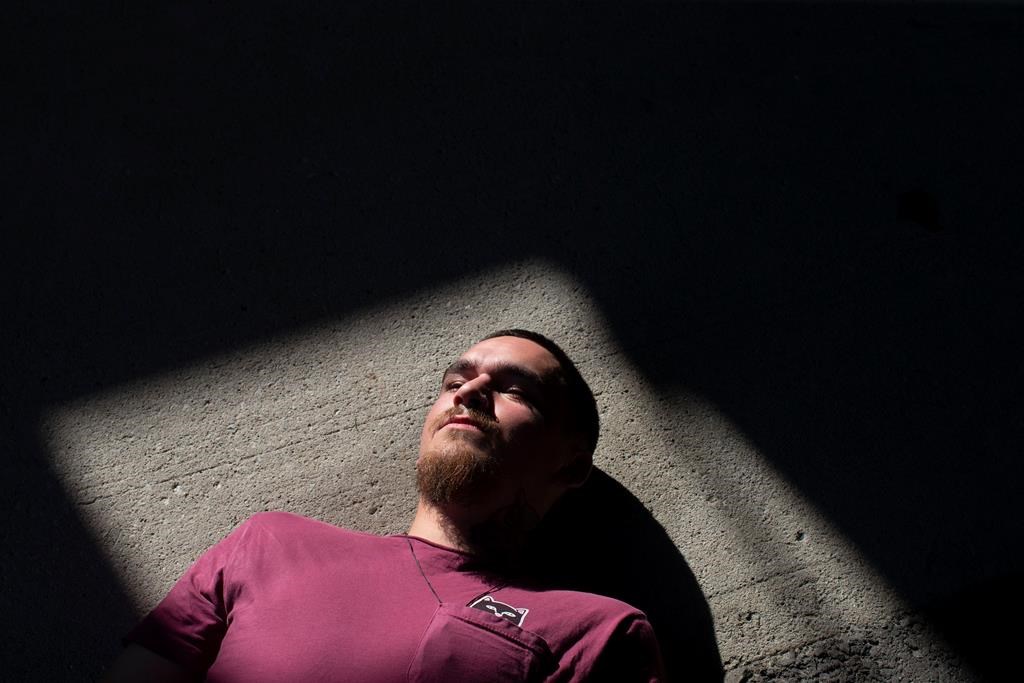TORONTO — Nunavut rapper FxckMr has seen the darkness and wants to share his story.
Living in Iqaluit for most of his life, he watched friends and family in the northern community endure incredible challenges, among them depression, addiction and suicide. He’s faced a few of them himself, and emerged on the other side.
Sitting in a Toronto cafe, the musician reflects on those who weren’t so lucky. Too many people take suicide as an exit route, he says.
“It’s something we talk about in general, not just in music,” explains the 22-year-old, whose name is written with its F-word expletive crossed out but spoken with the letters intact.
“Like, friends talking about who has done it, or people talking about how they want to. It’s literally something that’s going on all the time. And not just people my age, but adults with kids, it’s a f—ing epidemic… And we’re almost desensitized to it.”
FxckMr, born MisterLee Cloutier-Ellswort, still feels the sharpness of those losses.
He doesn’t spend much time reflecting on the ripples of colonialism and underfunded support systems that certainly played a role in leaving his community with such problems. The way he speaks about his experience is more immediate.
Last year, two of his friends stumbled upon the body of a former classmate who killed himself in his car outside a high school graduation party. He still feels guilt for being out of town when it happened.
“They could not talk about it, it was so heavy,” he says. “I felt like I should’ve been there for that night… you try not to think about it, but it’ll always come back and you’ll feel something.”
His debut album “1997,” which arrived in September after a number of acclaimed festival performances, captures some of the anger and resentment he’s collected in recent years. Against haunting beats, his groggy rap vocals talk about his own anxiety, drug use and mortality.
“Life n’ Death” plays like an inner monologue about his demons, while “Higher” submerges in the fog of a reckless lifestyle, and the closing track “Hunnid Grand” portrays him in the third person as a legend who’s already dead.
“It was me trying to figure out where I was at through all those kind of emotions. Addiction, depression and just feeling very stagnant,” he says.
“My thoughts were really loud and overwhelming last year. They were very distracting and I needed to be louder than my thoughts.”
Cloutier-Ellsworth’s enthusiasm for hip hop took shape as a teenager when rappers Childish Gambino and the late Mac Miller appealed to his interest in poetry. After living in Montreal for a year, he moved back to Iqaluit when he was 17, where he started freestyling with his friends.
When he performed with friend Thomas Matthew Lambe at their high school talent show, the positive reaction encouraged both of them to write harder.
They began working together, and separately, posting tracks on Soundcloud that generated buzz within their community and beyond. Lambe, who raps as 666God, is another rising voice of the Indigenous hip-hop scene. He picked up a Canadian Screen Award for “Trials,” a song featuring Tanya Tagaq’s throat singing that appears in the 2018 film “The Grizzlies.”
“Music was never even a dream until all of a sudden we were doing it,” Cloutier-Ellsworth says.
After graduating high school, Cloutier-Ellsworth penned songs inspired by rappers from urban communities a world away from Iqaluit life.
When New York emo rapper Lil Peep was found dead of an accidental overdose in late 2017, the news landed hard on Cloutier-Ellsworth.
Lil Peep, a rising Soundcloud star, had spoken openly about his battles with depression as he broke into the mainstream. His lyrics were also filled with references to his favourite drugs — and instead of recognizing that as a warning sign, Cloutier-Ellsworth became curious.
“I wanted to see what it was all about,” he says.
“I was a very reserved kid when it came to partying. I wasn’t even a drinker at all, but that Christmas break and New Year’s, me and my bros started experimenting — talking all night and doing our thing. It got really out of control.”
Cocaine was his drug of choice, but on certain nights psychedelic MDMA became the trip of the moment. Hard partying in Iqaluit was much different than city life, at least partly because it usually didn’t gravitate to the clubs and bars. Most nights he’d just sink into a couch amid the chatter of friends.
What started as dabbling once a month gradually became more frequent, and by March of last year he was spiralling into a serious habit.
“I didn’t see it coming at all,” he says. “It got out of control really fast.”
By spring Cloutier-Ellsworth was drowning in the lifestyle. This wasn’t how he imagined things would be, and even in his cloudy mindset he knew his life was falling apart.
“I was having some heavy breakdowns in front of friends, crying and angry at myself,” he said. “After a few good conversations I knew I needed to switch something up.”
Shaking the drugs took months, but he says by last November he’d weaned himself off of the substances.
Since the start of this year, Cloutier-Ellsworth has played key music festivals, including Toronto’s North By Northeast and Nunavut Music Week, as he builds his name. He also recently held a meeting with Canadian producer Rich Kidd, who’s helped a young Drake form his sound.
Those successes have encouraged him to write “happier music” that will eventually come to light. But Cloutier-Ellsworth says his story is built from a life of experience that few other voices can emulate.
“It feels good to be able to have that freedom,” he says. “To actually speak about what’s going on.”
This report by The Canadian Press was first published Nov. 6, 2019.
Follow @dfriend on Twitter.
David Friend, The Canadian Press







